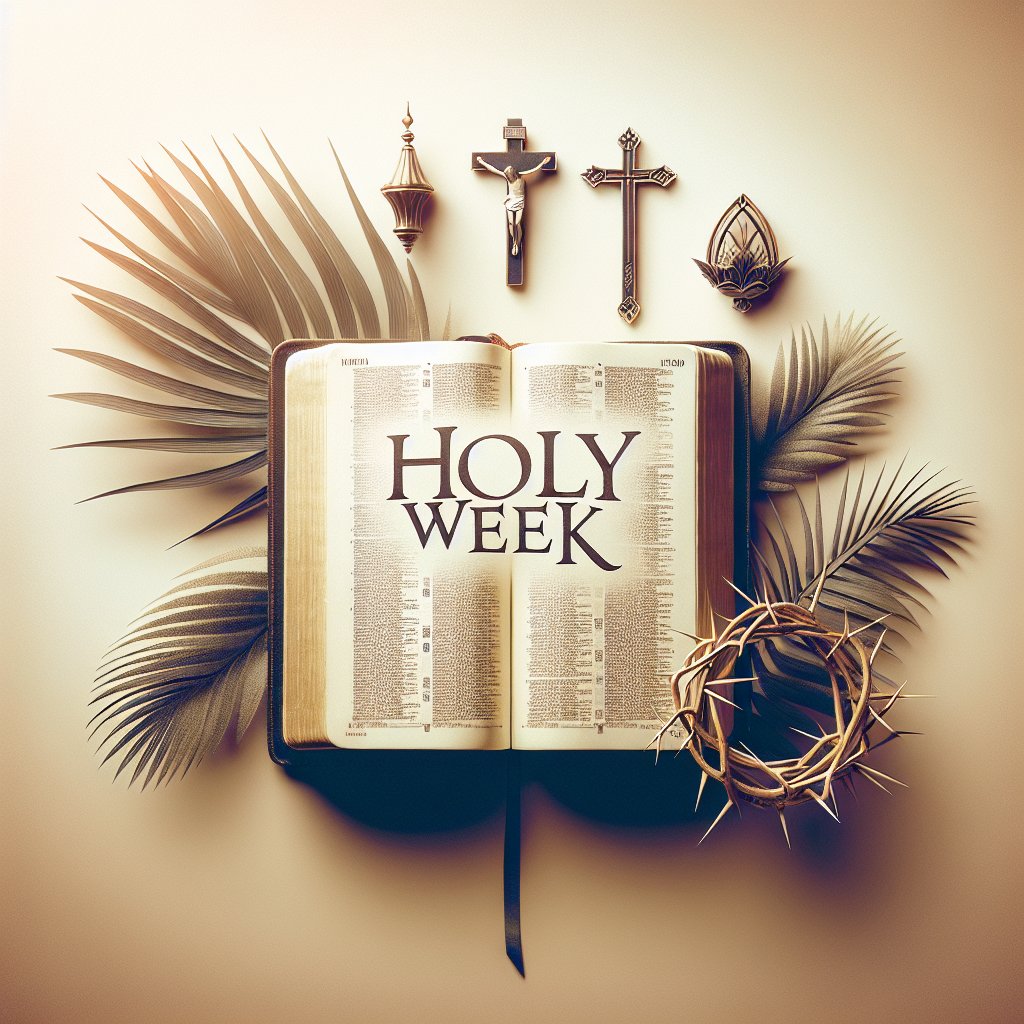Blog Post
Posted by Dion Todd April 14th, 2025 1,686 Views 22 Comments
Holy Week from Refreshing Hope Ministries on Vimeo.
Today marks the beginning of Holy Week—the week leading up to the most important events in Jesus' life. Tradition tells us that Holy Week began on Palm Sunday, around 33 AD. At that time, Jesus was in his early thirties. We use the BC/AD dating system, which was established around his birth, to help us mark these events. While some historians believe his birth may have been a few years earlier than traditionally thought, the key takeaway is that around 33 AD, when Jesus was about 33 years old, he began the week that would change everything.
Let's review some of the events in the life of Jesus Christ during that incredible week. The religious establishment, led by Caiaphas, the high priest, along with other Jewish leaders, had identified Jesus Christ and now Lazarus as serious threats to their powerless religion. Jesus was resurrecting people who had been dead for four days. Lazarus was one of them, and he was now walking around and talking to people, so they planned to eliminate him as well.
While Jesus was delivering people from evil spirits and healing them, the high priest Caiaphas was busy maintaining the status quo, enforcing religious laws, and preserving the power and prestige of the religious elite. Jesus pulled the curtains back and exposed the underbelly of their religion, and they hated Him for it. Their desire to maintain power was threatened by Jesus' growing influence, which led them to plot against Him. Instead of appreciating Jesus healing people, the Pharisees became offended and envious of His popularity.
So, the Jewish leaders felt frustrated. The disciples felt vindicated because they had left everything to follow Jesus, and now He was about to come to power. The crowds were thrilled and felt the long-awaited Messiah had finally come to deliver them from Rome. Meanwhile, the Roman soldiers were on high alert with the large crowds. All of this tension culminated in what is known as Holy Week.
Palm Sunday: On Palm Sunday, Jesus rode into Jerusalem on a donkey—exactly as the prophet Zechariah foretold (Zechariah 9:9). Not long before, He had raised Lazarus from the dead, a miracle that had people buzzing with excitement. As the news spread that Jesus was coming to Jerusalem, crowds gathered in the streets, waving palm branches and shouting, "Hosanna!"
The Jews had long waited in anguish for their Messiah, their Deliverer, to come. They expected Him to be a great warrior King like David who would rise up and free them from the Romans and set up an everlasting empire. Many expected the Messiah to bring a political revolution and lead a rebellion to drive out the Roman occupiers.
They quoted Psalm 118, the Psalm sung 100 years earlier when the warrior Judas Maccabaeus drove out the Greeks. Even the palm branches they waved were symbolic of the crowd's political aspirations, for the palm was the symbol on the coin of the second Maccabean revolt. Waving palm branches was symbolic of a nationalistic spirit. The crowd fully expected to see Jesus issue a call to arms and drive out the hated Romans (R. Kent Hughes).
His Apostles believed the same and that they would rule with Him. Yet, even while they were all celebrating, Jesus looked at the city with deep compassion. He knew what was coming, and He wept for Jerusalem. Later, after spending time in the temple and taking in what He saw, Jesus left the city and spent the night in Bethany, the small village where Lazarus, Mary, and Martha lived. (Matthew 21:1-11), (Mark 11:1-11), (Luke 19:28-44), (John 12:12-19).
Holy Monday: The next morning, Jesus and the twelve Apostles leave Bethany and head back to Jerusalem, which is just about two miles away. They were feeling hungry, and Jesus noticed a fig tree full of green leaves. Naturally, they stop by to see if they might find something to eat. But despite its lush appearance, the tree had no figs—nothing at all. Jesus cursed the fig tree. In a way, the empty fig tree symbolized more than just a missed meal. It reflected the state of Israel at the time—showing all the outward signs of being a God-fearing people without bearing any fruit when the Master came to check.
Jesus came to the temple in Jerusalem, which was meant to be a "House of Prayer" but had become a "Den of Thieves." The temple practices were riddled with greed, corruption, and exploitation of the faithful who came to worship God. It is said the high priest at the time auctioned merchant stalls in the temple courtyard to the highest bidder when there should have been no merchants there at all.
For years, the temple courtyard had been a bustling marketplace instead of a place to pray and meditate. Israelite men were required to pay a half-shekel temple tax annually, and the temple only accepted Jewish currencies. So, money changers were there to exchange foreign currencies at a crazy high exchange rate.
If you brought a sheep to offer, there would be "sheep inspectors" who may reject your sheep but then sell you an acceptable one at an inflated price. These were professional extortionists who took advantage of unprepared travelers coming to worship the Lord.
It was business as usual when suddenly, the Lord came to His temple (Malachi 3:1). Jesus proceeded to drive the money changers and animal sellers out of the temple area and overturned their tables, scattering their precious money everywhere. The apostles must have stared with open mouths, watching the Lion of Judah at work. When evening came, He went out of the city. (Matthew 21:12-17), (Mark 11:15-18), (Luke 19:45-48).
Holy Tuesday: Jesus and the twelve return to Jerusalem and spend the day with intensive teaching. Tuesday spans several chapters. The chief priests, scribes, and elders come to question who gave Jesus authority to do "these things." They were probably referring to Jesus chasing merchants around with a whip and turning their tables over the day before. Jesus said He would tell them if they told Him if the baptism of John was from God or man. They wouldn't answer Him, so He didn't answer them.
After the disciples pointed out the temple buildings, Jesus prophesied about their coming destruction in 70 AD. Jesus taught in the temple for a while and then left the city for the Mount of Olives, where He taught His disciples privately what is called the "Olivet Discourse," covering the destruction of the temple, signs of the end times, the abomination of desolation, and the need for watchfulness.
(Matthew 21:23-26:5), (Mark 11:27-13:37), (Luke 20:1-21:36).
Holy (Spy) Wednesday: While Jesus was in Bethany at the house of Simon the Leper, a woman poured a very expensive flask of Spikenard over Jesus' head. One of the apostles, Judas Iscariot, complained that this was worth a year's wages and should have been sold and given to the poor. But the Apostle John wrote that Judas said this only because he was a thief and used to help himself to their money bag (Matthew 26:6-13:), (Mark 14-3-9), (John 12:1-8).
After Jesus rebuked him, satan entered Judas, and he went and met with the chief priests. Judas agreed to lead them to Jesus for thirty pieces of silver. This is also called "Spy Wednesday" because Judas Iscariot was spying on Jesus, intending to betray Him.
(Matthew 26:14-16), (Mark 14:10-11), (Luke 22:3-6).
Maundy Thursday: In the Bible, a day begins at sunset and lasts until the following sunset (Genesis 1:5), so if Passover was on a Friday, then it began on Thursday evening that year. So Jesus and the twelve Apostles gathered in the upper room for their last supper together, a Passover meal. The Apostles had been arguing about which of them was the greatest on the way there and didn't know that Jesus would be crucified in less than twenty-four hours.
Because the servant was missing that evening, Jesus washed the feet of the Apostles one by one. Then, Jesus instituted the Eucharist, saying, "Do this in remembrance of Me." After supper, they sang a hymn together and went to the Garden of Gethsemane on the Mount of Olives to pray (Mark 14:26). (The name "Gethsemane" means "olive press.")
Jesus took Peter, James, and John with Him and prayed for an hour, going back and praying the same words three times until His sweat was as great drops of blood falling to the ground. An angel appeared to Jesus to strengthen Him. (Mark 14:32–33), (Luke 22:43-44).
Immediately after Jesus prayed the third time, a great multitude with swords and clubs led by Judas Iscariot showed up to arrest Jesus. Judas had told the mob that He would kiss Jesus on the cheek, so he betrayed Jesus Christ with a kiss. The Apostle Peter pulls a sword and chops off the high priest servant's ear, but Jesus says that is enough and heals the servant, who was named "Malchus." Jesus agrees to go with them if they allow His disciples to leave in peace.
(Matthew 26:17-75), (Mark 14:12-72), (Luke 22:7-65), (John 13:1-18:27), (John 18:10).
Good Friday: Jesus is rushed through a mock trial because His fate was already decided before He was arrested. They first took Jesus to the house of the high priest's father-in-law, Annas, for illegal questioning during the night. The guards mock Jesus and beat Him, and then they take Him to the Sanhedrin, the Jewish Court, where He is questioned by the high priest Caiaphas in a mock trial. Meanwhile, Judas Iscariot hangs himself, and Peter denies knowing Jesus three times.
The Sanhedrin court quickly condemns Jesus, so he is taken to the local Roman authority, Pontius Pilate, for sentencing. The Romans have stripped the Jewish court of its power, so they need a Roman ruler to condemn Jesus for them. Pilate is confused and doesn't know what to do about their mysterious charges, so he sends Jesus to Herod Antipas, the current "King of the Jews," or, more accurately, "Roman puppet."
King Herod questions Jesus but gets no answers, so he mocks Him, dresses Him in a royal robe, and sends Jesus back to Pilate, who wants nothing to do with this made-up case. Pilate knew they had arrested Jesus out of envy (Mark 15:10). Once a year at Passover, the Romans pardoned a prisoner, anyone the Jews asked for. So Pilate offered to release Jesus to the crowd that had gathered, but they requested a murderer, Barabas, to be released instead.
It was as if a legion of demons were attacking Jesus through the people. They spit on Him and beat Him with rods and whips, dressed Him in mockup clothes, and put a crown of thorns on His head. The crowd shouts, "Crucify Him," tears their clothes, and throws dust into the air. Finally, Pilate gives the insane mob what they want and hands Jesus over to be crucified. The Roman soldiers scourge Jesus, place a crown of thorns on Him, and drag Him out of town to Golgotha, which means "the place of a skull" (Matthew 27:33).
At about 9 AM (the third hour counting from 6 AM), Jesus is crucified, and at 3 PM, He dies. A sign above His head reads, "THIS IS JESUS THE KING OF THE JEWS." There was a great earthquake, the sun grew dark, the veil in the temple was torn from top to bottom, and some dead people in the tombs came back to life.
Between 3 and 6 PM, Joseph of Arimathea requested the body of Jesus, and after Pilate had checked that Jesus was certainly dead, he granted his request. Joseph, probably with the help of others, took the body of Jesus down from the cross, wrapped it in fine linen, and placed it in his own tomb. Nicodemus brought myrrh and aloes for the burial. Then, they rolled a large stone in front of the doorway.
(Matthew 27:1-60), (Mark 15:1-47), (Luke 23:1-56), (John 18:28-19:42).
Holy Saturday: Jesus' beaten, cut, and pierced body lies lifeless, entombed in a cold cave. This was the Sabbath day, and no one traveled or did any work. Yet, the chief priests and Pharisees went to see Pilate and asked him to set a guard over the tomb. A watch of at least four to sixteen Roman soldiers placed a seal over the stone in the doorway and stood guard over it. Breaking the Roman seal was a sentence of death, and the guards would also be executed if they allowed anyone inside. Apparently, even though His physical body was lying in a tomb, Jesus was preaching the Gospel to those who passed on (1 Peter 3:18-20). (Matthew 27:61-66), (Mark 16:1), (Luke 23:56).
We will continue next week with Resurrection morning!
You can pray this with me if you like:
Prayer: Heavenly Father, thank You so much for giving us Your Son and for caring so much for me. You are so good, and though I don't understand everything, I do understand that. I love You with all of my heart, soul, mind, and strength. May Your perfect will be done in my life. In the name of Jesus Christ, I pray. Amen!
Note: The Creation Photographers group theme of the week will be "A Gift God Gave You” or “A Sacred Space". All are welcome to join in with the theme or post anything that inspires you! To join, just click on the group name and then the join link on the page that will follow. As always, if you have a prayer need, we are here for you! We and the prayer team are ready to lift you up at our private prayer page: RHM Prayer Network.

This blog post has an accompanying Bible quiz: Holy Week Bible Quiz
Heavenly Father, thank You so much for giving us Your Son and for caring so much for me. You are so good, and though I don't understand everything, I do understand that. I love You with all of my heart, soul, mind, and strength. May Your perfect will be done in my life. In the name of Jesus Christ, I pray. Amen! ❤️🤟🏻
Good Morning, After reading Rev. Dion's message this morning, I am reflecting on this Holy Week which is the Holiest Week of the Year! Jesus stepped in and sacraficed is life so that we as brothers and sisters in Christ would live with God Our Father in Heaven and Jesus for all eternity. This week reminds me to reflect on what Jesus did each day prior to His crucifixtion! We as brothers and sisters of Christ must remember that Jesus, the sacrifical lamb gave so much so that we would be free from sin and to love one another as He loves each and everyone of us. I thank you Jesus for the sacrafice you did to save us from damnation. Without you, I am nothing and you give me strength each day which is anew!! I pray that as each and everyone of us goes through this week, that we stop, think and reflect on what this week truly means as we prepare for "Ressurection Sunday!" May Our Lord Jesus Christ, bless you and shine his beautiful light in you as we are God's precious children. In Jesus precious name I pray, Amen🙏❤️🕊️!! Allelulia 🙏🕊️🙏!! Amen 🙏🙏🕊️🕊️🙏🙏
Comment from Wanda Pennington
2 days ago
Amen Sister in Christ. HALLELUJAH!!!
Comment from Valeri Frank
2 days ago
Amen! 🙏🏼 Happy Holy Monday to you Marisa... May you have a wonderful week. 🕊️❤️
Heavenly Father, thank You so much for giving us Your Son and for caring so much for me. You are so good, and though I don't understand everything, I do understand that. I love You with all of my heart, soul, mind, and strength. May Your perfect will be done in my life. In the name of Jesus Christ, I pray. Amen.





Comment from Sylvia Todd
15 hours ago
190% ~ impressive 😂!